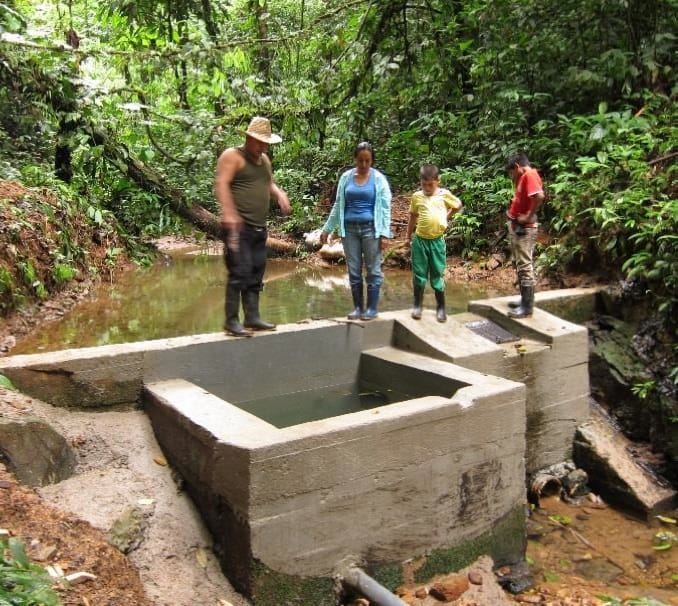Increasing the Yachaikury Community’s Access to Clean Water
A Report to the White Feather Foundation
From the Amazon Conservation Team November 2014
In 2014, with its generous gift of $5,000, the White Feather Foundation has assisted the Amazon Conservation Team® (ACT®) and its indigenous partners, Tandachiridu Inganokuna (the Association of Inga Communities of Caquetá, hereafter called “Tanda”) in making significant progress towards the goal of furnishing a permanent solution for providing the community of the Yachaikury Ethnoeducation School (Yurayaco, Caquetá, Colombia) with an adequate and clean water supply.
Since the construction of Yachaikury’s current aqueduct, the local town of Yurayaco built its aqueduct upstream from that of the school. As such, when the stream’s water levels are low, the school is left with almost no running water. Additionally, at the time that the system used to pipe water from the aqueduct to the school was built, Tanda did not have access to the technical expertise necessary to ensure it was built for longevity, and has suffered from the need for frequent repairs. Breaks in the pipes have contributed to water contamination and disruptions in school’s water supply.

Assessment of current aqueduct

…which requires frequent repairs
In August 2014, after several representatives attended a reunion/graduation ceremony at Yachaikury, the Department of Social Prosperity (DPS)—an agency of the Colombian national government—agreed to fund Yachaikury’s master infrastructure design plan. This agreement was struck on the condition that Tanda would construct a new aqueduct to ensure a more consistent water supply for the school. With the construction of the new aqueduct now being slated for next year—much sooner than originally anticipated—it was decided to postpone the installation of the bio-sand filters until after the new water supply system has been installed.
Towards this end, ACT hired a team of expert consultants to conduct the initial studies and develop the designs necessary to construct the new aqueduct. The team conducted an assessment of Yachaikury’s existing aqueduct—determining whether any of its components could be reused in the construction of the new system—and visited the site proposed by the school community for the new aqueduct on a different nearby stream. The consultants conducted their work in a participatory manner, continually discussing the possibilities and challenges of this initiative with the school community. Based on their assessment, the team developed a detailed design plan for the new aqueduct (see below). Construction of the new water supply system is slated to begin in 2015, once the necessary funding is secured. In conjunction with construction process, the school will implement a reforestation project at the site of the new aqueduct. Doing so will provide Yachaikury’s students with the opportunity to apply their learning in ecosystem conservation to protect the source of their drinking water.

Part of the design plan for new aqueduct

